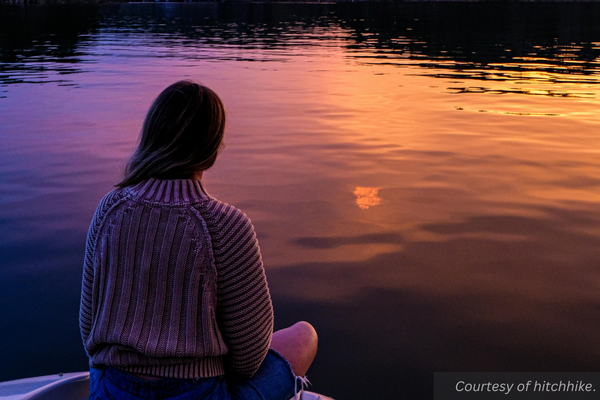“Give Yourself a Valentine” is part of a monthly column of mental health articles by Karen Munson. Read the previous article, “Water Is Essential, so Drink Up!,” at the link.
If you have a lake and some bread, you don’t need to be alone on Valentine’s Day. And, if you only have your company and the fish’s, you are in the best of company. Read on to see why.
Types of Love
Love has many names in Greek and Latin, depending upon the application. There is eros relating to physical love or sexual desire. It involves passion, lust and romance. Eros is also Cupid, the Roman name for the cherub we associate with shooting magic arrows to make people fall in love.
Next is philia, affectionate love, the kind that strong friends feel toward each other. Plato believed that the strongest marital relationships started with philia and resulted in eros.
Agape is unconditional, selfless love without expecting anything in return. This type of love motivates service to strangers.
Familial love is defined as storge. This is the relationship between most parents and children, siblings, and relatives.
Some types of love are unhealthy, such as mania — an excessive obsession — with a stalker-type of behavior.
Ludus is a playful type of love that can evolve into philia or eros. It is flirting and having fun without commitment.
Pragma love is practical (think pragmatic). It is based on duty or obligation, such as in royalty or arranged marriages.
The Best Love
After all these types of love, I propose that another type is the absolutely most important. Philautia is self-love and healthy pride in oneself. It is not arrogance or conceit but rather confidence and humility in one’s ability to do and learn. We can love others freely and unconditionally only when we love ourselves. Then, and only then can we love others through our fulness, not out of need.
International author and podcaster Mel Robbins helps listeners understand that people who love themselves don’t worry about what other people think or let others derail their dreams. They know how to tap into their own strengths and listen to their inner vision for their lives. They protect their peace. It is taking control of their peace of mind and happiness. It is not giving others the ability to control their mood or self-esteem. They let others be themselves. They do not try to manage or control others.
They understand that they and they alone are responsible for their own happiness and how they show up. They know how to define their values and what makes them happy. They know they will make mistakes and have learned how to forgive themselves. They know they can choose what they say yes to and when to say no. They don’t worry about things that don’t matter or things they have no control over.
People who love themselves choose how to respond, how to act, and how to live. They have their power, and they know it. They no longer give their power away. They are best friends with the one person who will be with them throughout their entire life. They treat themselves well.
This is of course the ideal. Every relationship needs continual adjusting, including the one with yourself. But as we are kinder to ourselves, we are able to be kinder to others and everyone is elevated.
Be Your Own Valentine
You will be with yourself longer than any other person. Oscar Wilde once said, “To love oneself is the beginning of a lifelong romance.” When you love yourself, you are investing wisely in the future. If you have no one else to share your love with on Valentine’s Day but yourself and the fish, enjoy your own company.
– by Karen Munson
Feature image caption: Even if you only have your company and the fish’s, give yourself a valentine. You are in the best of company.

Karen M. Munson – Escalante
Karen is an associate editor at The Byway. She is fascinated and fulfilled by all things involved with writing. After graduating from BYU, she taught English at Escalante High School for three years. She pursues opportunities to write and support others in their writing. Karen has published three books with four more scheduled to be released in 2024. She and Reed are the parents of ten children and the grandparents of 35 grandchildren.
Karen is the author of the New Twist on Mental Health column in The Byway.

